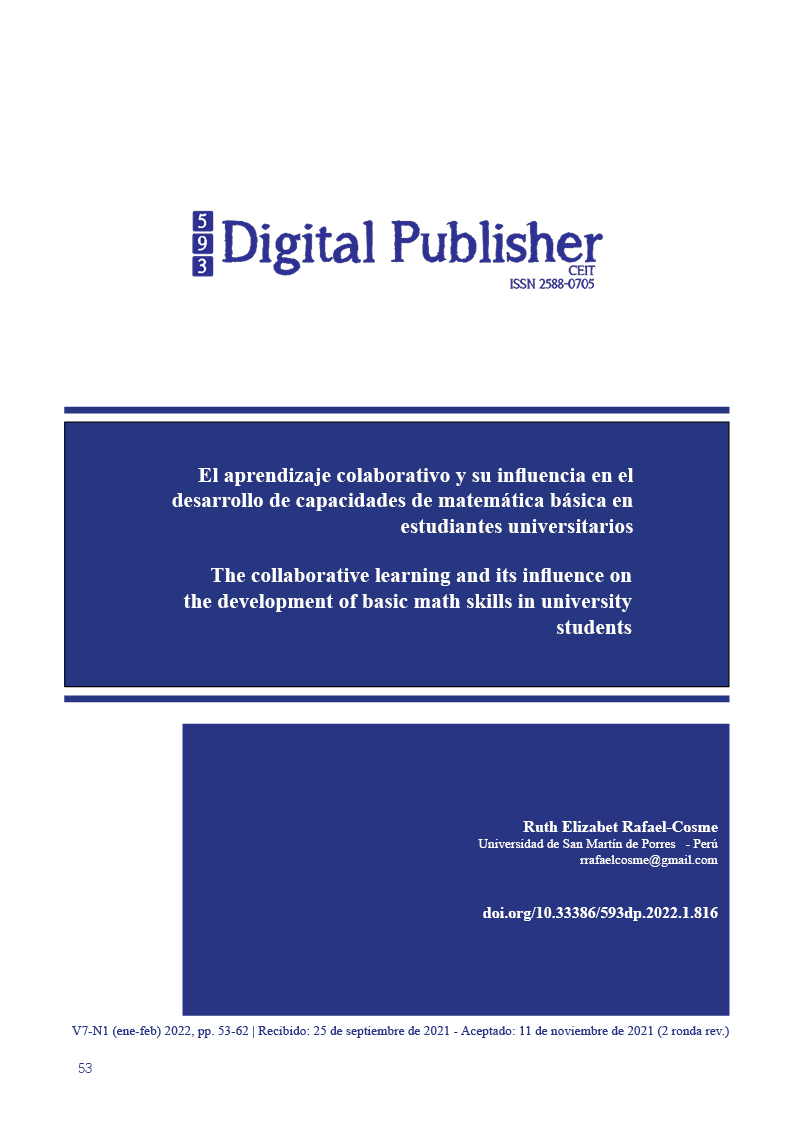The collaborative learning and its influence on the development of basic math skills in university students.
Main Article Content
Abstract
The aim of this study, that has been investigated, was specify how collaborative learning transcended the development of basic math skills of the students of the first cycle of the professional school of Administration and Systems of “Universidad Peruana Los Andes” university of the city of Huancayo region Junín, of the 2018 semester – I. The methodology was quasi-experimental- applicative. The sample is equivalent to 88 students divided into two groups proportionally for the control group and the experimental group, in each section there were 44 students, section A1 was considered as the control group and section A4 as the experimental group. Collaborative learning was used in the experimental grouping; the field work was carried out with an evaluation applying the pretest and a posttest. The control group worked with the traditional methodology and in the same way applying a pre-test and then and a post-test. About results, it was determined that collaborative learning significantly influences the development of skills in basic mathematics, as well as in each of its dimensions: propositional logic, the real number system, equations and inequalities and relationships and functions.
Downloads
Article Details

This work is licensed under a Creative Commons Attribution-NonCommercial-ShareAlike 4.0 International License.
1. Derechos de autor
Las obras que se publican en 593 Digital Publisher CEIT están sujetas a los siguientes términos:
1.1. 593 Digital Publisher CEIT, conserva los derechos patrimoniales (copyright) de las obras publicadas, favorece y permite la reutilización de las mismas bajo la licencia Licencia Creative Commons 4.0 de Reconocimiento-NoComercial-CompartirIgual 4.0, por lo cual se pueden copiar, usar, difundir, transmitir y exponer públicamente, siempre que:
1.1.a. Se cite la autoría y fuente original de su publicación (revista, editorial, URL).
1.1.b. No se usen para fines comerciales u onerosos.
1.1.c. Se mencione la existencia y especificaciones de esta licencia de uso.
References
Chilca, M. (2017). Autoestima, hábitos de estudio y rendimiento académico en estudiates universitarios. Revista de Psicología Educativa USIL.
Delgado, K. (2016). Aprendizaje Colaborativo. Magisterio.
García, C. (2014). Aprendizaje colaborativo en grupos virtuales [Tesis doctoral, Universidad Oberta de Catalunya]. Repositorio Institucional.
Lázaro, N. (. (2017). La deserción estudiantil en educación superior: S.O.S. en carreras de Ingeniería Infómática. VII CLABES, 1-9.
Mur, L. (2013). Análisis de técnicas de aprendizaje colaborativo on-line (TAC) para la didáctica de las cs [Tesis doctoral Universidad de Zaragoza]. Repositorio Institucional.
OCDE. (2017). Marco de Evaluación y de Análisis de PISA para el Desarrollo: Lectura, matemáticas y ciencias,versión preliminar. https://www.oecd.org>pisa>aboutpisa>ebook - PISA-Frame.
Vásquez, L. (2014). Estrategias de aprendizaje colaborativo en el desarrollo de actitudes ambientales en alumnos de la asignatura de educaión ambiental de la Facultad de Educación y P de la UMCH [Tesis de maestría, Universidad Nacional de Educación Enrique Guzmán y Valle]. Repositorio Institucional.


